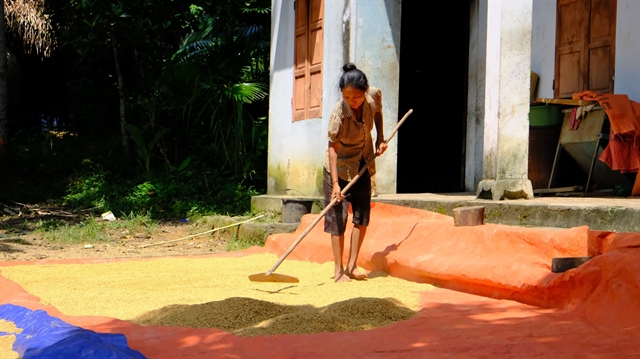 Society
Society

 |
| A Đan Lai ethnic woman dries rice outside her house in Cửa Rào Village, Môn Sơn Commune, Con Cuông District in Nghệ An central province. Đan Lai people have mastered agricultural work. — VNA/VNS Photo Bích Huệ |
NGHỆ AN — La Thị Nguyệt in Cửa Rào Village is the first Đan Lai ethnic person to write an application to leave the list of poor households in Môn Sơn Commune, Con Cuông District.
While drying sesame, Nguyệt explained that the Đan Lai ethnic group received instructions on growing rice, corn, acacia, and vegetables and raising livestock, poultry and fish.
Their life is still difficult, but it is more stable than before.
Nguyệt's family grow rice and vegetables, combined with rearing cattle, chickens and ducks. They have an income of more than VNĐ50 million (US$2,000) per year.
Đan Lai ethnic group lives mainly in the mountainous area west of Nghệ An central province.
The Đan Lai ethnic group was in danger of extinction because of poverty and consanguineous marriage but in recent years they have confidently integrated with other groups.
As well as Nguyệt's family, La Van Sơn's family is also doing well.
His family grows farm produce. They planted more than two hectares of pine wood combined with goat farming.
They earn tens of millions of đồng each year.
La Thị Hương, 80, said that residents now have electricity, clean roads and schools.
Children's education is convenient, and healthcare has improved.
Cửa Rào Village now has 36 households with nearly 170 people.
People in the village have mastered planting and agricultural production, working closely together to build a new life.
Some outdated customs of the Đan Lai ethnic group, child marriage, consanguineous marriage and prolonged funerals, are no longer present.
Deputy chairman of the Môn Sơn Commune People's Committee, Ngân Văn Trường, said that their residence was more convenient for daily life, medical examination and treatment and children's learning.
In addition to growing corn, acacia and raising cattle and poultry, many households are better off trading groceries or working abroad.
All of the residents in the village have permanent houses, access to the national grid and hygienic water and all children can go to school.
Sustainable livelihood
In 2006, the Government approved conservation and sustainable development project for the Đan Lai ethnic group living in the core area of the Pù Mát National Park.
The project was like a 'rescue', taking 146 Đan Lai families out of the forest.
The thirty other households in Cò Phạt Village were given electricity infrastructure, roads, schools and other infrastructure to make eco-tourism sites.
In 2007, 44 households continued to move out of the forest to a new residence in Thạch Ngàn Commune, Con Cuông District.
Since then, hundreds of Đan Lai people have moved to the new place.
Lương Viết Tùng, head of the Con Cuông District Ethnic Affairs Division, said that at the resettlement site in Môn Sơn and Thạch Ngàn communes, the Đan Lai people received support from the State to build solid and spacious houses.
They are provided with production land, seeds, fertilisers, livestock and agricultural tools.
They also receive instruction to grow rice and raise livestock.
Many training classes on agriculture, forestry, and livestock production techniques have been organised.
Lô Thanh Huấn, chairman of the Thạch Ngàn Commune People's Committee, said that nearly 20 Đan Lai people work abroad, and about 30 people work as workers in foreign companies.
They also have seasonal work to have extra income.
To conserve, sustain and improve the material and spiritual life of the Đan Lai people, the Prime Minister on December 19, 2006, issued Decision No 280/2006/QĐ-TTg, approving the project "Conservation and sustainable development of Đan Lai ethnic group living in the core zone of the Pù Mát National Park in Con Cuông District, Nghệ An Province", or often called Project 280.
Under the project, the Đan Lai ethnic group will invest in developing essential socio-economic infrastructure for community development, support houses, toilets, livestock, production land, seeds and materials. They are also supported in education, culture and health care. In addition, they will receive training to have a task force of the Đan Lai ethnic group.
Hoàng Sỹ Kiện, chairman of the Con Cuông District People's Committee, said that the district was proposing the Government recognise the Đan Lai ethnic group as a separate ethnic group to enjoy specific policies of the Party and the State.
In addition, local authorities will support them in replicating good livelihood models to create jobs and stable incomes. — VNS




